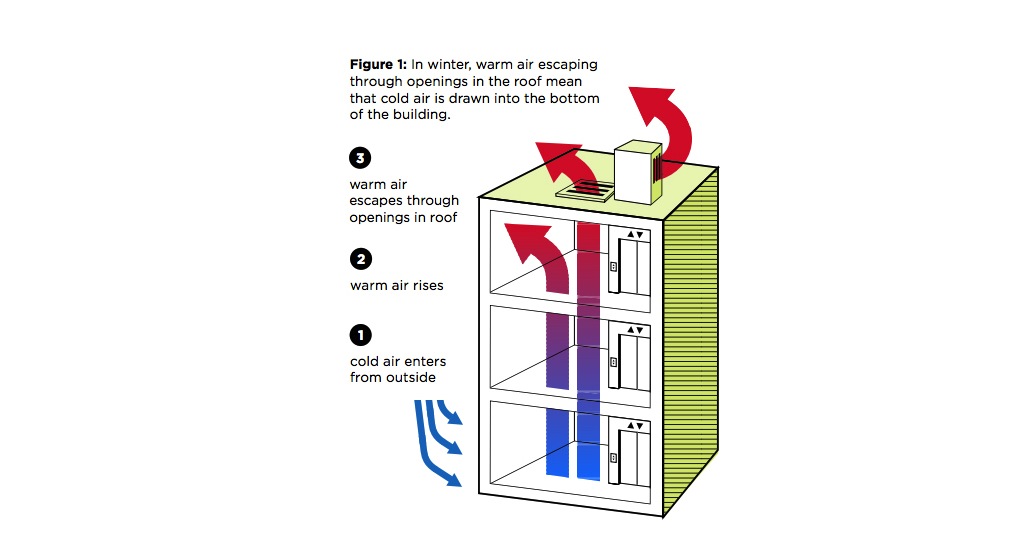New York City should focus on elevator shafts to improve the energy efficiency standards of its high-rise residences, according to a new report from the Urban Green Council.
A typical New York apartment building loses thousands of dollars worth of energy every year from leaky elevator shafts that vent warm air at the top of the building and draw in cold air at the bottom.
The report, “Spending Through the Roof says that apartment building owners pay an average of $3,400 a year to replace heat lost through the roof. In taller buildings, the cost can be more than $20,000 a year.
Plugging this type of air leak can cost from $500 to $15,000. If the leaks were plugged on 4,000 tall apartment buildings in the city, landlords would collectively save $11 million a year, while keeping 30,000 metric tons of greenhouse gases out of the atmosphere.
Elevator shafts and stairwell openings were required to vent smoke in the case of fire. But construction practices and firefighting techniques have changed, so the vents now "are needlessly open all the time."
Codes governing stairwell vents haven't changed since 1929 so there's no legal way now for building owners to fix the problem.
Related Stories
| Aug 2, 2013
Netherlands Institute of Ecology built to zero waste principles
The Netherlands Institute of Ecology was designed and built to be the most sustainable building in Holland and incorporate the zero waste principles of Cradle-to-Cradle design.
| Aug 2, 2013
Threat of more powerful coastal storms could curtail development
Led by Stanford University’s Natural Capital Project, researchers mapped the intensity of hazards posed to communities living along America’s coastlines from rising seas and ferocious storms now and in the decades to come.
| Jul 26, 2013
AGC launches new coalition to help bring tax relief to construction sector
Associated General Contractor of America (AGC) has launched the Coalition for Fair Effective Tax Rates to bring tax relief to the construction sector.
| Jul 26, 2013
Legislation would revamp federal contracting policy impacting small design and construction firms
Legislation was introduced in the U.S. House of Representative this month to ban reverse auctions when an agency determines small businesses are qualified to bid on the solicitation.
| Jul 26, 2013
Detroit’s problems may make blue infrastructure codes more likely
The City of Detroit’s financial problems may make it more likely to adopt blue infrastructure standards.
| Jul 26, 2013
Cities should reconsider rooming houses to build affordable housing stock, says expert
Building codes have effectively outlawed the bottom end of the private housing market, driving up rents on everything above it, argues the Sightline Institute's Alan Durning.
| Jul 17, 2013
WorldGBC, IFC pledge to rapidly scale up green construction in emerging markets
IFC, a member of the World Bank Group, and the World Green Building Council (WorldGBC) are collaborating to rapidly scale up the construction of green buildings in emerging markets.
| Jul 17, 2013
Louisiana governor signs $250 million bill for 29 community college projects
Louisiana Gov. Bobby Jindal signed into law this month a bill that provides $251.6 million for 29 projects at Louisiana Community and Technical College campuses.
| Jul 17, 2013
U.S. House continues to block enforcement of light bulb standards
The House of Representatives last week voted to block the enforcement of light bulb standards that many say would effectively force people to buy more expensive compact fluorescent bulbs.
| Jul 17, 2013
Should city parking space requirements be abolished?
Some cities are deliberately discouraging construction of new parking spaces by allowing the construction of buildings with a lower ratio of parking spaces to dwellings (as low as 0.75 spaces per residence).













